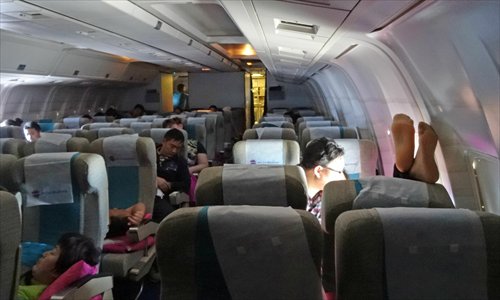HOME >> CHINA
Bad behavior of Chinese airline passengers in the spotlight
By Yuen Yeuk-laam Source:Global Times Published: 2015-8-12 19:18:01

An airplane passenger puts their feet up on the back of the seat in front in Shanghai in February. Photo: CFP
A 12-year-old girl and her family were stopped from getting on a plane after the girl verbally abused airline staff, drawing public attention to the ongoing problem of Chinese travelers acting in an uncivilized manner, as at least five similar cases have occurred within the last month.
On August 6, all passengers of Xiamen Airlines flight MF8036 were told to get off the aircraft because there was a delay. The girl insulted airline staff in front of others when she was leaving the plane.
A staff member reported to the pilot, who then demanded the family apologize. They refused. The incident was then reported to the Air Operation Center (AOC) and the family was told they would not be flying that day.
On August 10 Xiamen Airlines decided to punish the cabin crew which provoked an online controversy, with many netizens slamming the family's rude behavior.
Jet-setting jerks
Following the rapid growth of the Chinese economy, the number of airline passengers has increased significantly. The number of airline journeys taken by Chinese travelers rose to 354 million in 2013 from 319 million in 2012, a 10.8 percent increase. There were just 231 million journeys in 2009.
However, bad behavior has also been growing. In July, at least three people were detained for using mobile phones in the air, smoking in planes' toilets and even beating up airline staff.
A flight attendant surnamed Yip, who has been working in the industry for three years, told the Global Times that the number of Chinese mainland and Indian passengers has been increasing rapidly in recent years.
"Some mainland passengers are very impolite to flight attendants and lack manners. They think they can do whatever they want because they paid for the tickets," Yip said, adding that many of them are taking airplanes for the first time.
"Some of them do not know how to flush the toilet, and often mainland passengers do not know how to find their seats or demand to change their seats. Others insist on leaving their seats when the seat belt sign is on and asking to fill up their bottle with water," he added.
"About half of the population in China is fairly well-off, while some are nouveau riche," Hu Xingdou, a social science professor at the Beijing Institute of Technology, told the Global Times. "But the problem is that citizens' behavior has not developed as fast as the economy," he said.
Back down to earth
An airplane passenger who refused to turn off his phone was detained for 10 days in Shenzhen, Guangdong Province on Tuesday, the Guangzhou Daily reported Wednesday. The passenger allegedly yelled at flight attendants and attempted to fight with security staff.
Wang Jiangmin, a research fellow with the World Civil Aviation Resource Net, based in Hefei, East China's Anhui Province, told the Global Times that many Chinese people are not familiar with air travel.
"For example, a delay is not the airline's fault but it is often caused by poor weather and the AOC's instructions. In fact, the airline suffers a loss when their flights are delayed. But many people do not understand this and vent their anger on the airline staff and crew members," he said.
In response to such incidents, the Civil Aviation Administration announced in December 2014 that they were planning to create a blacklist mechanism to record and punish unacceptable behavior.
"Uncivilized behavior has a big impact on a plane because of the limited space and large number of passengers. If there is violence, it may pose a threat to others," Wang said.
Wang added that the behavior of Chinese passengers is improving gradually as people recognize this kind of behavior is wrong, which can be seen from the scorn netizens pour on these uncouth travelers.
"It is a process and one day these behaviors will be less common," he said.
Newspaper headline: In-flight fight
Posted in: Society